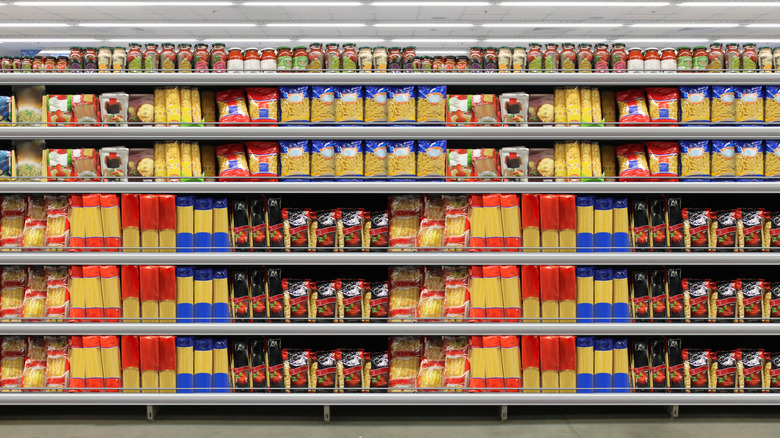You're Not Imagining It, Store Brands Are Getting Fancier
AmazonBasics. Archer Farms. 365 Everyday Value. Kirkland Signature. Great Value. Most will be familiar with store brands, because these are ones shoppers tend to use for basics day in and day out.
That might not have been the case a few years back, when many opted to leave a store-branded item on the shelf to pick out a name brand alternative in a phenomenon The Simple Dollar called "store brand stigma," or the sense that a store brand was somehow not as good as its more famous (and often more pricey) counterpart. That feeling isn't based on any logic, argues The Simple Dollar — because while we know that the contents of a name brand vs a store brand are as close as it's going to get, customers are often drawn to a name brand item because they're trained to think it is better.
In our collective defense, store brands of the past did little to make themselves stand out. They were plainly packaged, had names we didn't recognize, and as a result, managed to give us the impression that the products themselves were somehow as inferior as the packaging design.
But all that is changing.
Consumers have a growing preference for store brands
Global management consulting giant McKinsey says retailers are seeing a growing trend that shows a customer preference for store brands, thanks in part to the pandemic, which saw grocery shelves wiped out as a result of supply hoarding and panic buying. Store labels also got a boost when shoppers began tightening their wallets, and they found themselves reaching for more budget-friendly alternatives.
Retailers have a good reason to give their store brands more than just a spit shine. As The Wall Street Journal reports, while store brands may be cheaper, they also end up making more money for their parent company — and that profit can range from 10 to 40%. In response, companies are "follow[ing] in cult grocer Trader Joe's footsteps" by redesigning and investing in their private labels.
But there is another reason why store labels are being viewed in a whole new way. As Mike LaVitola, the chief executive at convenience store chain Foxtrot, put it, "The biggest motivation for us is having products no one else has," — a surefire way to gain customer loyalty and ensure that they return.
More shoppers turned to store brands during the pandemic
The rewards are big for retailers who get their store brand strategies right. The Private Label Manufacturers Association says that in 2019, one out of every four items sold in the U.S. belonged to a store brand line (via Forbes). A survey conducted the same year by the association found that two thirds of those that took part felt that "in general, store brand products I have bought are just as good if not better than the national brand version of the same product."
The trend continued during the pandemic, when nearly 40% of consumers told McKinsey they had "tried new products or brands" during the lockdowns, and that almost 20% of grocery shoppers bought more store label items than they did before the pandemic hit. That sentiment ended up driving sales 13.6% to $123 billion in 2020, according to data intelligence firm NielsenIQ (via The Wall Street Journal).
Carman Allison of NielsenIQ sees it this way: "How we shop and where we shop is changing. Retailers are investing in their private label brands as they seek ways to differentiate themselves and meet evolving consumer needs". And if it works, building up store brands could well be a win-win strategy for both retailers and buyers at either ends of the grocery supply chain.


